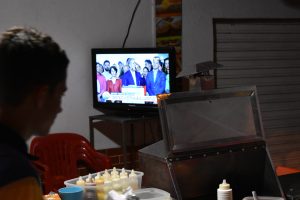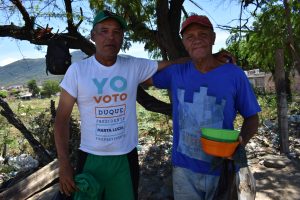
Photo courtesy of @IvanDuque.
Newly elected President Iván Duque was 20 minutes into his victory speech Sunday night when he expressed his gratitude for the support of Álvaro Uribe Vélez. It was commonplace at Duque rallies that the mere mention of the former President’s name would lead to a euphoric response from the crowd coupled with chants of ‘Uribe! Uribe!’. Sunday night was no different.
Yet, as the crowd chanted his name, Uribe was nowhere to be seen. Having been a vocal and at times caustic surrogate during the campaign, he did not share the stage with his protege as he had when Duque won the first round of the elections cycle. In fact, Uribe’s response to Duque’s victory over political nemesis Gustavo Petro was relatively subdued. At around 9:30pm last night, Uribe tweeted “God bless Colombia. God rewards those who act in good faith.”
In addressing his elder, Duque bowed to the past. After the results of last night many will be wondering whether the Centro Democrático candidate, who is set to become Colombia’s youngest president, will also defer to that past as well.

A restaurant worker looks on as Duque delivers his victory speech. Photo by Arjun Harindranath
It is a very Colombian trait to mouth lyrics to a song that might only be a decade old; to sing it with such abandon that the song is imbued with nostalgia. Rather than belonging to the recent past, it’s as if it belongs to an earlier lionised time.
For many, the Uribe years are looked on with such nostalgia. Former journalist Ingrid Velez Toro is one such Uribe supporter that pines for the early days when former President Uribe steered a country that afforded greater economic security as well as personal security. “He freed a country kidnapped by the guerrillas that suffered four car bombs a month, 45 thousand murders and 4,000 kidnapped.” Velez Toro said, “Thanks to him, we were able to leave the cities again, travel the country’s roads and reactivate tourism, foreign investment and regain hope.”
The Santos years have seen by large swathe of Colombians yearn for a return to the years of Uribe. Many who feel that the peace accord ceded too much ground to the FARC now hope to return to the strong hand that kept them safe and financially secure. Duque is now the new generation of a song they’ve heard before and they rewarded him kindly with their votes. With the exception of departments along the Pacific, Caribbean and Bogota, Duque was able to secure the rest of the country’s confidence in his ability to return Colombia to that past.
Duque succeeded in shifting the narrative from fear of the past to the anxiety many held about the near future, particularly across their eastern border with Venezuela. Rampant inflation, widespread hunger and a spike in crime have led over a million Venezuelans to flee to Colombia in search of a better life. The Duque campaign was so successful in communicating this narrative that even Venezuelans, many former chavistas, believed that Petro would turn Colombia into their homeland.
In voting for Iván Duque on Sunday the people of Colombia chose the past over the possibility of a dystopian future.

Venezuelan Duque supporters in Los Patios, Norte de Santander. Photo by Arjun Harindranath
Duque will be sworn in as President on August 7. When he does so he’ll have inherited many challenges–an unequal society, the deteriorating situation in Venezuela, narcotrafficking, corruption, a degraded environment–including the scepticism whether he has either the experience or the ability to counter the excesses of his mentor. In thanking Uribe Duque has bowed to the past. If he goes on to defer to it, he will be met with fierce opposition. His rival Petro has already expressed the desire to return to the Senate to mount that opposition.
After a peaceful exercise of their democratic rights, Colombians have had their say on their future. Duque may have been handpicked by his mentor many years ago but he has now been chosen by his people to lead Colombia into that future.




